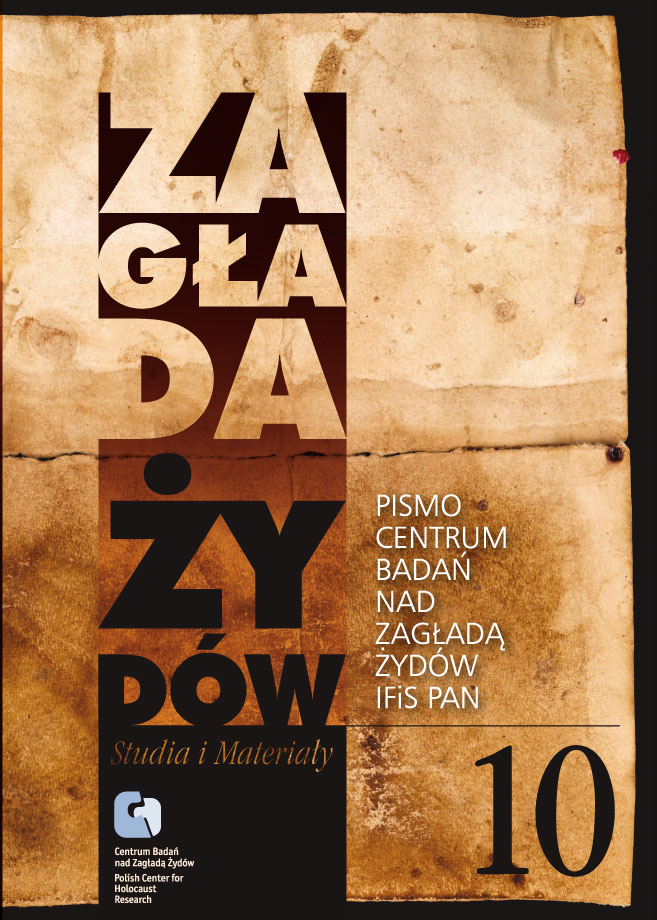Empty Space and Its Persuasiveness. The language in Adolf Hitler’s last text
Zagłada Żydów. Studia i Materiały, No. 10 (2014), Pages: 665-672
Submission Date: 2020-10-26Publication Date: 2014-12-01
 https://doi.org/10.32927/ZZSiM.543
https://doi.org/10.32927/ZZSiM.543
Abstract
This article is an attempt to comment on Adolf Hitler’s “Last Political Testament” – a text without a precedent in the history and culture of the last century. Initially debating whether the document should be classified as a testament, Kuczyńska-Koschany suggests (just like Saul Friedländer) putting this genre category in inverted commas because of Hitler’s total lack of civil courage and because the style is characteristic not so much of a last will as of final orders. Hitler’s document is contrasted with Janusz Korczak’s autobiography, which he wrote six months before his death and which could be treated as his testament. After reading these two documents, in a way incomparable, it becomes clear, that they confirm their authors’ life, testifying to the emptiness and aimlessness of the former and to the authenticity and decency of the latter. Finally, a detailed analysis of the language and style of Hitler’s “testament,” which lacks neither mistakes nor dangerous euphemisms, reveals the truth about the author and the ideology which he served and whose “lackey” he was.
Keywords
Adolf Hitler , Janusz Korczak , racism , LTI , euphemism , “testament”
License
Copyright (c) 2014 Author&"Holocaust Studies and Materials"

This work is licensed under a Creative Commons Attribution 4.0 International License.
https://creativecommons.org/licenses/by/4.0
The journal is published under the Diamond Open Access Standard, CC-BY-4.0 Deed - Attribution 4.0 International - Creative Commons
Most read articles by the same author(s)
- Katarzyna Kuczyńska-Koschany, Erntefest – from Etymology to Implementation , Zagłada Żydów. Studia i Materiały: No. 15 (2019)
- Katarzyna Kuczyńska-Koschany, Too small to be (so) large. Reflection on the margins of the critical Polish edition of Adolf Hitler’ Mein Kampf , Zagłada Żydów. Studia i Materiały: No. 17 (2021)
Similar Articles
- Adolf Hitler, Hitler’s Political Testament , Zagłada Żydów. Studia i Materiały: No. 10 (2014)
- Agnieszka Witkowska-Krych, Janusz Korczak’s Ghetto Diary and War-Time Sources from Korczak’s Orphanage. How Did They Survive? , Zagłada Żydów. Studia i Materiały: No. 8 (2012)
- Katarzyna Kuczyńska-Koschany, Too small to be (so) large. Reflection on the margins of the critical Polish edition of Adolf Hitler’ Mein Kampf , Zagłada Żydów. Studia i Materiały: No. 17 (2021)
- Marta Ciesielska, “A Lot of Effort and Beauty in the Life of the Boarding House.” From Jan Korczak’s Orphanage , Zagłada Żydów. Studia i Materiały: No. 8 (2012)
- Agnieszka Witkowska, Ostatnia droga mieszkańców i pracowników warszawskiego Domu Sierot , Zagłada Żydów. Studia i Materiały: No. 6 (2010)
- Dariusz Libionka, On Henryk Woliński’s correspondence with Adolf Berman , Zagłada Żydów. Studia i Materiały: No. 4 (2008)
- Agnieszka Witkowska-Krych, Main Shelter Home , Zagłada Żydów. Studia i Materiały: No. 13 (2017)
- Jan H. Issinger, Frankenstein in the Warsaw Ghetto. The History and Legend , Zagłada Żydów. Studia i Materiały: No. 12 (2016)
- Marta, Procedures Reversing Circumcision Performed in Warsaw During World War II. An Initial Attempt at Description , Zagłada Żydów. Studia i Materiały: No. 13 (2017)
- Agnieszka Witkowska-Krych, Joanna Beata Michlic, Piętno Zagłady. Wojenna i powojenna historia oraz pamięć żydowskich dzieci ocalałych w Polsce [Agnieszka Witkowska-Krych] , Zagłada Żydów. Studia i Materiały: No. 17 (2021)
You may also start an advanced similarity search for this article.
 English
English
 Język Polski
Język Polski



 https://orcid.org/0000-0002-1671-2278
https://orcid.org/0000-0002-1671-2278





